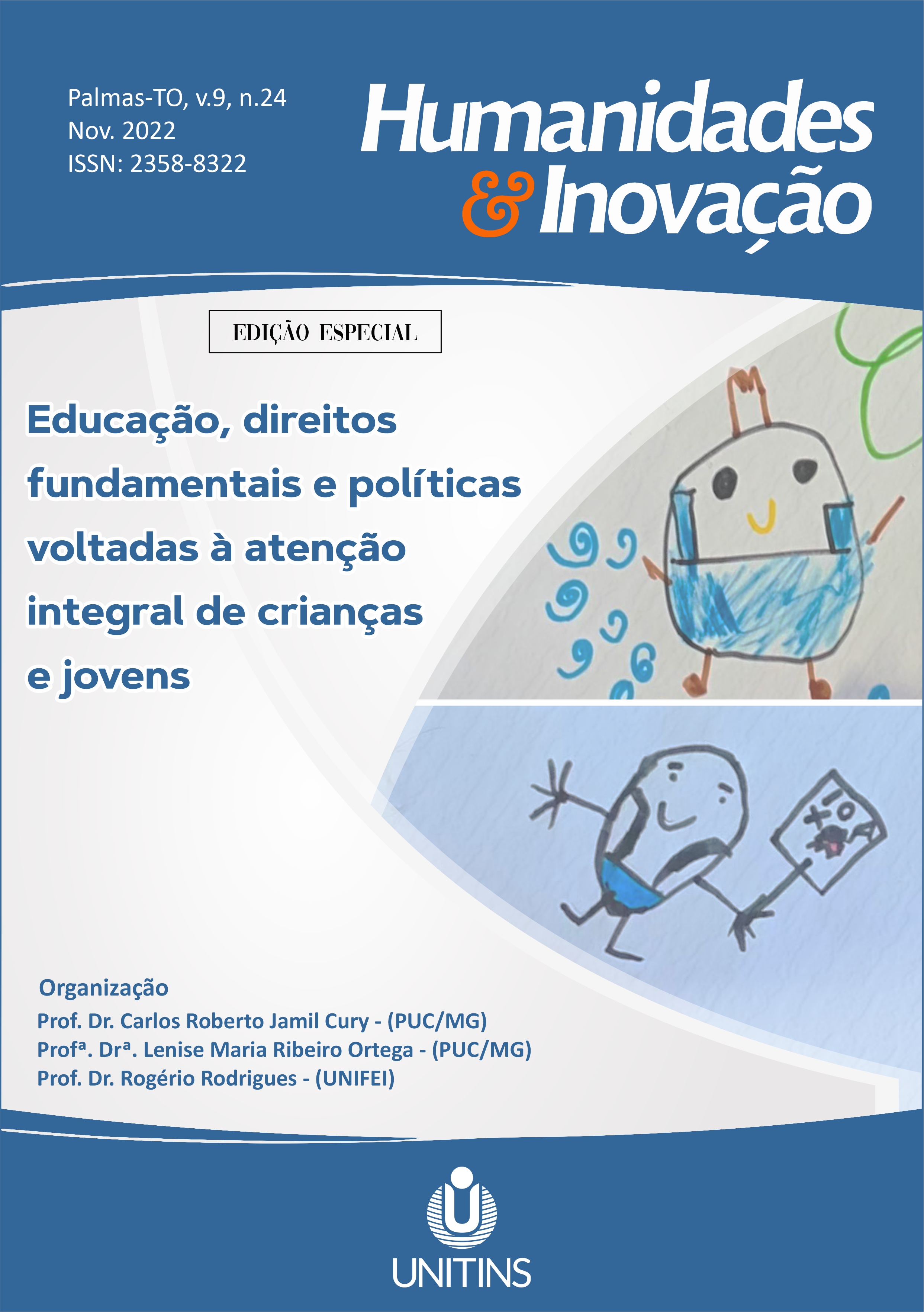THE CHILDREN’S RIGHTS TO WELL-BEING IN THE CONTEXT OF THE PROFESSIONAL NEEDS AND THE CHOICE OF THE FUTURE PROFESSION OF EARLY CHILDHOOD EDUCATORS
Resumo
O objetivo do estudo de abordagem mista foi investigar os motivos mais comuns que os jovens têm ao decidir escolher sua futura profissão na educação infantil em nossas circunstâncias. Foi realizado em uma amostra de 100 professores em serviço da instituição em Banja Luka (Bósnia e Herzegovina). O estudo qualitativo de linha de base produziu resultados preliminares: o programa universitário deve incentivar o crescimento e desenvolvimento pessoal dos jovens na direção de sua autonomia, pensamento criativo, ética, reflexão e outras qualidades de aprendizagem ao longo da vida. A pesquisa quantitativa inclui vários fatores da profissão de na sociedade, como fatores socioeconômicos, profissionais, pessoais e fatores do programa de estudos, bem como os fatores de competências transversais importantes para a profissão da educação universitária da primeira infância. As implicações do estudo vinculam esses fatores a uma abordagem holística para a promoção dos direitos da criança no bem-estar, particularmente a capacidade de alcançar e desenvolver potenciais por meio do bem-estar físico, social e emocional.
Palavras-chave: Professores da educação universitária da primeira infância. Preferências dos jovens pela profissão. Bem-estar emocional, social e físico das crianças.
Referências
BUCHBERGER, F.; CAMPOS, B. P.; KALLOS, D.; STEPHENSON, J. Green Paper on Teacher Education in Europe: High-Quality Teacher Education for High Quality Education and Training: Thematic Network on Teacher Education in Europe. Umea: Umea University, 2000. Available at: https://projects.au.dk/fileadmin/projects/TEPE/Green_Paper_on_Teacher_Education_in_Europe.pdf
CARE, Esther; LUO, Rebekah. Assessment of Transversal Competencies: Policy and Practice in the Asia-Pacific Region. Paris-Bankok: UNESCO, 2016. Available at: https://unesdoc.unesco.org/ark:/48223/pf0000246590
CUNHA, Flavio; HECKMAN, J. James. Investing in Our Young People. NBER Working Paper No. 16201. Cambridge, MA: The National Bureau of Economic Research, 2010. Available at: https://www.nber.org/papers/w16201
DAHLBERG, Gunilla; MOSS, Peter; PENCE, Alan. Beyond Quality in Early Childhood Education and Care: Postmodern Perspectives. London: Falmer Press, 1999.
ELLIOT, Enid. We’re not robots. The Voices of Daycare Providers. Albany: State University of New York Press, 2007.
FUKKINK, Ruben; JILINK, Lisanne; OP DEN KELDER, Rosanne; ZEIJLMANS, Kirti; BOLLEN, Iris; KOOPMAN, Letty. The Development of Interaction Skills in Preservice Teacher Education: A Mixed-methods Study of Dutch Pre-service Teachers. Early Childhood Education Journal, v. 47, 2019, pp. 321–329. Available at: https://doi.org/10.1007/s10643-019-00927-7
MASHFORD-SCOTT, Angela; CHURCH, Amelia; TAYLER, Collete. Seeking Children’s Perspectives on their Wellbeing in Early Childhood Settings. International Journal of Early Childhood, v. 44, no. 3, 2012, pp. 231–247. Available at: https://doi.org/10.1007/s13158-012-0069-7
NEW ZEALAND GOVERNMENT. A Vision for the Teaching Profession. Education Workforce Advisory Group Report to the Minister of Education Final Report. April, 2010. Avalaible at: https://www.beehive.govt.nz/sites/default/files/10.pdf
PALLANT, Julie. SPSS priručnik za preživljavanje [SPSS Manual for survival]. Beograd: Mikro knjiga, 2011.
POLLARD, Elizabeth. L.; Lee, Patrice. D. Child well-being: A systematic review of the literature. Social Indicators Research, v. 61, no. 1, 2003, pp. 59–78. Available at: https://doi.org/10.1023/A:1021284215801
Author. 2012.
Author. 2014
Author. 2019.
SAHLBERG, Pasi. Finske Lekcije. Šta Svet Može da Nauči iz Obrazovnih Reformi u Finskoj? [Finnish Lessons. What Can the World Learn From Education Reforms in Finland?]. Beograd: Novoli, 2013.
STATISTICAL INSTITUTE OF THE REPUBLIKA SRPSKA. Preschool education in school 2011/2012-2015/2016 years. The second extended edition. Banja Luka: Republički zavod za statistiku, 2016. Available at: http://www2.rzs.rs.ba/static/uploads/bilteni/obrazovanje/predskolsko_obrazovanje/Predskolsko_Obrazovanje_br9_2.izdanje.pdf
TEMPLE, Elizabeth; EMMETT, Susan. Promoting the Development of Children's Emotional and Social Wellbeing in Early Childhood Settings: How can we Enhance the Capability of Educators to Fulfil Role Expectations? Australasian Journal of Early Childhood, v. 38, no. 1, 2013, pp. 66-72. doi:10.1177/183693911303800111
TIKLY, Leon. Towards a Framework for Researching the Quality of Education in Low-Income Countries. Comparative Education, v. 47, no. 1, 2011, pp. 1-23. https://doi.org/10.1080/03050068.2011.541671
VARGAS-BARÓN, Emily. Scientific Evidence and Benefits of Investing in Early Childhood Learning. Video Presentation from the Conference Let's Increase the Opportunities for Children in BiH for Early Learning. Sarajevo, February 2012, UNICEF BiH, 2012. Available at: http://www.youtube.com/watch?v=yP5Iit2SLFg&list=PLE5735C81EEF68898
WEIKART, David. Appropriate Developmental Early Childhood Education. In: UNESCO. Educare in Europe. Report of the conference held in Copenhagen, Denmark, October 1992. Paris: The United Nations Educational, Scientific and Cultural Organisation, 1992.
WILLIAMS, Peter. Lessons from the Future: ICT Scenarios and the Education of Teachers. Journal of Education for Teaching, v. 31, no. 4, 2005, pp. 319–339. Available at: https://doi.org/10.1080/02607470500280209
ČEPIĆ, Renata; TATALOVIĆ VORKAPIĆ, Sanja; LONČARIĆ, Darko; ANĐIĆ, Dunja. Considering Transversal Competencies, Personality, and Reputation in the Context of the Teachers' Professional Development. International Education Studies, v. 8, no. 2, 2015, pp. 8-20. Available at: http://dx.doi.org/10.5539/ies.v8n2p8
A submissão de originais para este periódico implica na transferência, pelos autores, dos direitos de publicação impressa e digital. Os direitos autorais para os artigos publicados são do autor, com direitos do periódico sobre a primeira publicação. Os autores somente poderão utilizar os mesmos resultados em outras publicações indicando claramente este periódico como o meio da publicação original. Em virtude de sermos um periódico de acesso aberto, permite-se o uso gratuito dos artigos em aplicações educacionais, científicas, não comerciais, desde que citada a fonte (por favor, veja a Licença Creative Commons no rodapé desta página).











